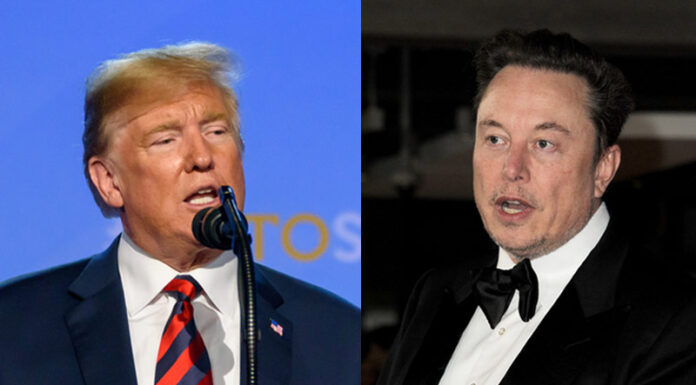The explosive public feud between President Donald Trump and tech billionaire Elon Musk reached new heights on June 5, 2025, as both men launched increasingly personal attacks over social media, threatening to upend critical government operations and billions of dollars in federal contracts.
The conflict escalated when Musk responded to Trump’s Oval Office criticism by claiming on X that without him, Trump would have lost the 2024 election. Musk indicated that Democrats would control the House and Republicans would hold only a 51-49 Senate majority without his support, accusing the president of being ungrateful.
The confrontation began when Trump told reporters in the Oval Office on June 5 that he was very disappointed by Musk’s vocal criticisms of the “One Big Beautiful Bill Act,” just passed by the House of Representatives. The president claimed that Musk knew what was in the bill and had no problem with it until electric vehicle incentives had to be cut. Trump suggested Musk’s opposition stemmed entirely from the removal of EV tax credits that would have benefited his Tesla company.
In a series of Truth Social posts, Trump declared that Musk was “wearing thin” and that he had asked him to leave the administration. The president wrote that he took away Musk’s EV mandate that forced everyone to buy electric cars that nobody wanted, which he knew for months he was going to do. Trump then posted what would become the most inflammatory comment of the day: “The easiest way to save money in our Budget, Billions and Billions of Dollars, is to terminate Elon’s Governmental Subsidies and Contracts.”
Musk’s response was swift and dramatic. After learning of Trump’s suggestion to terminate his government contracts, the SpaceX CEO announced on X that his company would begin decommissioning its Dragon spacecraft immediately. This threat sent shockwaves through the space industry, as Dragon represents the only American vehicle currently capable of transporting astronauts to and from the International Space Station.
The potential decommissioning would have left NASA without its primary means of accessing the $100 billion orbiting laboratory, forcing reliance on Russian Soyuz spacecraft for astronaut transportation. About $22 billion of SpaceX’s government contracts could be at risk according to industry estimates, though the actual classified figure may be significantly higher. SpaceX has received more than $20 billion in contracts from NASA, the Air Force, and other agencies since 2008.
NASA Press Secretary Bethany Stevens responded diplomatically to Musk’s threat, stating on X that the space agency would continue to execute upon the president’s vision for the future of space. Stevens emphasized that NASA would continue working with industry partners to ensure the president’s objectives in space are met, though she declined to comment specifically on SpaceX’s role.
The feud intensified when Musk made additional claims about Trump’s tariffs causing a recession in the second half of 2025. In response to a post questioning whether Trump should be impeached and replaced by J.D. Vance, Musk simply wrote “Yes.” The tech mogul also made provocative allegations about Trump’s connection to Jeffrey Epstein files, though these claims were condemned by the White House.
However, by late evening on June 5, Musk appeared to step back from his most extreme threat. After an X user with the handle @Fab25june urged both men to “cool off and take a step back for a couple days,” Musk replied with “Good advice. Ok, we won’t decommission Dragon.” This de-escalation provided some relief to NASA and space industry officials who had been concerned about the potential disruption to critical space operations.
The underlying dispute centers on Trump’s massive tax and spending package, which Musk has called a “disgusting abomination” that would add $2.4 trillion to the federal deficit. Musk criticized the legislation on June 3, 2025, writing that the massive, outrageous, pork-filled Congressional spending bill represented fiscal irresponsibility. His opposition has energized Republican deficit hawks in the Senate who were already concerned about the legislation’s scope.
Several Republican lawmakers have expressed solidarity with Musk’s fiscal concerns. Representative Thomas Massie of Kentucky, one of only three House Republicans to vote against the spending package, has supported Musk’s position. Senator Rand Paul of Kentucky agreed with Musk’s assessment, stating that both had seen massive waste in government spending and that another $5 trillion in debt would be a huge mistake. Senator Mike Lee of Utah has called on the Senate to make the bill better, while Senator John Kennedy of Louisiana suggested that Musk was right to be concerned that Americans are quickly becoming debt slaves.
House Speaker Mike Johnson defended the legislation, dismissing Musk’s criticism as fundamentally flawed. Johnson, who said he spoke with Musk for more than 20 minutes, characterized the bill as the largest tax cut in history and the largest investment in border security in a generation. Johnson expressed confidence that when the bill is signed into law, every American will benefit before the midterm elections.
The public nature of the dispute has raised concerns about its potential impact on Republican unity and the party’s prospects in the 2026 midterm elections. Musk, who spent nearly $300 million backing Trump and other Republicans in the 2024 election, has threatened to support primary challenges against politicians who voted for the spending bill. The tech billionaire reminded lawmakers that while Trump has 3.5 years left as president, he will be around for 40-plus years.
The feud’s effects were immediately visible in financial markets, with Tesla shares falling 14.3 percent on June 5, erasing about $150 billion in market value. The dispute has also complicated efforts to pass the tax-cut bill in the Senate, where Republicans hold only a slim majority and can afford few defections.
The confrontation marks the first major public rift Trump has had with a top adviser since taking office for his second term. Many Washington observers had predicted an eventual falling out between the two men, both known for their large egos and tendency to use social media to attack perceived enemies. The relationship had already shown signs of strain following Musk’s departure from his official government role leading the Department of Government Efficiency just days earlier.
As the Senate works toward a July 4 deadline to pass the spending legislation, the durability of the apparent truce between Trump and Musk remains uncertain. The dispute has highlighted the growing influence of private contractors in government operations and raised questions about the wisdom of concentrating so much critical infrastructure in the hands of a single company. With the International Space Station scheduled for retirement by the end of 2030, the temporary resolution of this conflict may only postpone larger questions about America’s space program and its dependence on private industry partnerships.








